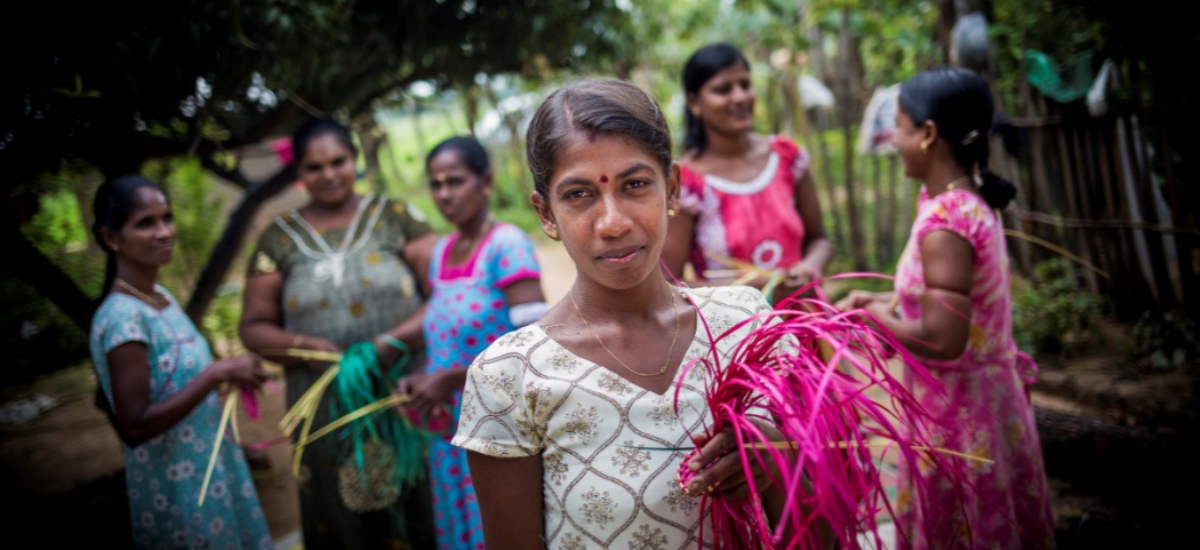Photo courtesy of We Effect
The transitional justice process in Sri Lanka has come to a grinding halt. Reconciliation between the majority and minority communities has never before seemed such a distant dream as the government goes out of its way to create fear, distrust and polarisation in its determination to consolidate power.
From 2015 to 2019, the previous government made a few attempts to give life to some of the four pillars of process but it was slow to follow up and even the mechanisms that exist today are lagging far behind in their responsibilities.
The present government has turned its back on reconciliation, withdrawing in February 2020 from the country’s co-sponsorship the Human Rights Council’s resolution 30/1 that obligated Sri Lanka to take forward the transitional justice process, claiming that a local system would be put into place. One year later, there has been no progress and in reality, the country has moved even further away from reconciling. Just two examples are the forced cremations of Covid-19 bodies in contradiction of Muslim religious beliefs and the refusal to allow the Tamil community to remember its war dead publicly.
The government is facing a barrage of international criticism over its continuing suppression of minority rights and its abject failure to address the wrongs of the past as it heads to defend its stance at the upcoming session of the Human Rights Council in Geneva. Already in the “shoot the messenger” mode, the government’s UN representative in New York, Mohan Pieris, condemned the Office of the High Commissioner for Human Rights, victims groups and human rights organizations as tools of “vanquished terrorists” in front of the General Assembly.
The Core Group on Sri Lanka has confirmed that it would be presenting a new resolution promoting reconciliation, accountability and human rights.
In a widely circulated and commented upon report on the situation in Sri Lanka, the United Nations High Commissioner for Human Rights, Michelle Bachelet, said “Nearly 12 years on from the end of the war, domestic initiatives for accountability and reconciliation have repeatedly failed to produce results, more deeply entrenching impunity, and exacerbating victims’ distrust in the system. Sri Lanka remains in a state of denial about the past, with truth-seeking efforts aborted and the highest State officials refusing to make any acknowledgement of past crimes. This has direct impact on the present and the future.”
The four pillars of transitional justice are truth, justice, reparations and the guarantee of non-recurrence. Under the former government, an Office on Missing Persons (OMP) was set up in 2016 and an Office of Reparations (OR) in 2018, the only progress in going forward with transitional justice.
Referring to the two mechanisms David Griffiths, Director of the Office of the Secretary General at Amnesty International, said“Thousands of relatives and survivors who have suffered terribly from the conflict are depending on these mechanisms to provide the truth, justice, and reparations they have long struggled for. To close the chapter on this dark period in the country’s history, both bodies must be allowed to function effectively – their work, which is yielding some results, is far from finished.”
Reparations are made by governments to make amends for wars, serious crimes and abuse. Reparations seek to repair the rights of individuals and communities that have been affected by human rights violations and provide State recognition of victims’ rights by addressing the suffering caused by violation of those rights.
The OR was made functional in April 2019 with the appointment of five members by the Constitutional Council. It is chaired by former Justice Ministry Secretary, Dharani Wijayathilake. Its mission is “To create a developed Socio-economic environment through rehabilitation and reconstruction for the citizens affected by the ethnic violence or terrorist activities in order to facilitate and ensure the resumption of a normal life.”
But its focus today is on compensating victims of the Easter Sunday attacks in 2019. The office has received 16,275 applications of which 4,385 have been processed from January to November 2020, totalling Rs. 142 million paid in compensation. Since coming into power in November 2019, the government stopped issuing interim relief payments through the OR to families of the disappeared, putting them under great financial strain. It remains unclear how and when the office intends to compensate other victims of serious human rights violations, including the families of the disappeared.
Reparations for whom is a question not easily answered in the Sri Lankan context. As Ms. Bachelet noted in her report, state officials do not acknowledge any crimes in the past and actively thwart any efforts to find the truth or bring perpetrators to justice. For reparations to be effective, victims have to be identified and acknowledged and the need to be compensated. An added complication arises with the missing when families do not want to accept death certificates because it is an acknowledgement of a death without a body and without knowing what happened to the missing person. In the south, since many decades have passed, there is more willingness to accept death certificates, which will make it possible to get on with sorting out inheritance matters and collecting benefits.
In her report, Ms. Bachelet encouraged a strong gender focus in the reparations programme since many victims and survivors were women. Among the recommendations in her report was to ensure that the OMP and OR could operate effectively and independently and to provide them with resources and technical means and to give interim relief measures for affected families with a gender focus. She also said the government should support civil society initiatives and efforts for reparation and victims’ assistance.
Sri Lanka needed a gender sensitive reparations system because female survivors of political and sexual violence had increased care responsibilities and had fewer opportunities for economic engagement in comparison to males. During or after conflict situations, women take sole responsibility of caring for their families. If women were widowed, they could be ostracized in their communities.
One of the civil society initiatives promoting reparations with a gender focus is the Centre for Equality and Justice (CEJ), which advocates gendered reparations within the framework of the Reparations law.
“Women are the most affected by war and there are numerous female headed households. This includes women from all three communities including Sinhalese from the south who were affected by the JVP insurrection and still have received no compensation,” said Shyamala Gomez, Executive Director of CEJ.
The CEJ has done extensive research on what women want as means of reparations. Reparations are not merely about monetary compensation but also include memorialisation with a monument or a street name, an apology by the perpetrator and acknowledgement of the crime committed, as well as psychological support, health facilities, education opportunities and livelihood training. Some victims may want their land back so they can return to a place they know as home instead of being resettled elsewhere.
“One of the most telling aspects is how so many women say that no one has come to talk to them, to find out how they are managing or offer them counselling,” said Ms. Gomez.
Many of the women also want perpetrators to be brought to justice but most of them were simply struggling to exist and support their families. To claim benefits, they often have to negotiate a bureaucratic labyrinth.
CEJ’s research has shown that many women wanted memorialization and symbolic acts that would acknowledge the harm and loss of the war. This was also in criticism of previous efforts at providing money or other goods and considering it as the only form of reparations. Many of them indicated that a holistic process that considered the psychological, physical and social needs of individuals and communities was needed. A few of the women highlighted the importance of the state acknowledging the harm that was caused and seeking forgiveness from affected families.
The general understanding of reparations among the women was that reparations aimed to address a loss. They referred to the loss of lives, the loss of physical mobility, the loss of property and the loss of financial and employment opportunities.
However, some women were unwilling to come forward and claim reparations because of the stigma attached to acknowledging that one had a missing relative or had been sexually assaulted. They also fear they would be targeted for revenge by those who had committed the crimes.


